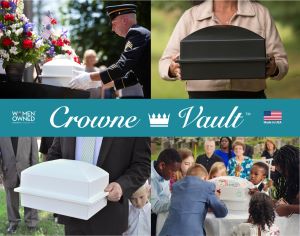A couple of recent economic trends. . . Will they affect funeral service?

Just the other morning I read two articles from Yahoo Finance which showed a couple of trends happening in American society. The first trend can be read about in this article titled “There are more Americans out of work than their are jobs open for the first time since 2021″.
And the second article, that you can read about here, was titled “Retail spending is starting to look more and more like the labor market“. Among other interesting facts the article makes this comment, “Consumers in the top 10% of the income distribution accounted for 49.2% of total spending in the second quarter, registering the highest level recorded since 1989.”
Reading those articles made me think about Death Care and how these economic indicators might come to play in the Death Care world. While the ramifications of these indicators is wide, I have some thoughts that may or may not be correct assumptions. I think the big take-away is simply to be aware of what is happening in our economic sphere and be prepared to respond with business decisions as you need to.
Labor — Here is a quote from the first article concerning employment, “Unemployed workers are staying out of work for longer, even as layoffs remain low. This suggests the shift is less about an increase in people losing jobs and more about a decline in job openings. In other words, the challenge right now lies less in job security for those already employed and more in the difficulty of reentering the labor market once you’re out of it.”
In the funeral director and/or mortician sphere finding quality help continues to remain one of the top concerns of funeral home owners and managers in almost every survey that comes out. And, the latest latest job placement statistics I have is that in 2024 there were 2,106 graduates of mortuary science schools across the U.S. and 84% of them found employment.
I’m wondering if emloyment is “tightening up” among funeral homes and if it is that may bode well for companies in keeping their personnel costs from increasing at a higher than inflationary rate.
I’m also wondering if a decline in job openings in other occupations might spur more people to look to funeral service. Many people who don’t understand all the nuances of funeral service look to the profession as one with a “secure” future. Latest statistics also tell me that there were 3,363 new enrollees in funeral service programs so, I believe that, the pipeline looks good for future employees.
It very well could be that a tight job market in other occupations brings a better outlook for funeral home owners and managers as more and more people may look to enter the Death Care field. With demograpahic indicators suggesting that the number of deaths in America will rise over the next 10-20 years, this would be welcome news to the profession.
Disparity of Consumer Spending — There is a lot to document that the wealthiest in our society are spending more and the lower end of the economic population is spending less as inflation keeps a hold on an elevated number. Many economists suggest the United States economy is on a “K-shaped” recovery method as those who have extra assets that are invested are gaining at a greater than average rate and those with less or no invested assets are seeing buying-power erode — hence, the statement from above where “Consumers in the top 10% of the income distribution accounted for 49.2% of total spending. . .”
One of the easiest areas to see this is in the hotel sales sphere —- Here’s what one economist suggested, “That lower-income households are seeing weaker income growth is one explanation for why demand is weakening for the most affordable lodging options.” So as low-cost hotel chains such as Choice and Wyndham are having difficult times the more luxurious chains such as Hyatt, Hilton, and Marriott seem to be doing just fine.

Tom Anderson
Funeral Director Daily
So, what does that disparity of consumer spending mean for funeral homes? You might argue that those with lower means will feel financially unsecure at the time of death and opt for lower priced services such as direct cremation. I don’t necessarily think that is true because there are so many variables in the choice of Death Care disposition and so many personal opinions and choices. While in-hand assets will make a difference to many at the time of death not everybody will lower their choice standards because of a temporary lack of available funds.
I’m not so sure that funeral homes can survive a “K-shaped” economic recovery “if” only about 10% of the populous does almost 50% of the death-care spending. In an economy where the other 90% of the population spends the other 50% I’m not so sure that those Death Care services would bring much in the way of margins. That’s why it is imperative that funeral homes can give options to families who may be temporarily low on funds because of an economy that is costing them more than normal for simple-living necessities.
Will this situation lead to more crowd-funding such is available with the funeral service profession’s expert at such Treasured Memories Community Funding? I don’t know, but it would probably be wise for all funeral homes to know how to access that option for those client families that may need the help.
Funeral homes are a different business. . . one in which one person equals one death call — and where each death call equals only one purchase. Other areas of the economy could have one person buying six televisions or one person buying three cars.
In a world where cars or televisions are sold all that really matters is that enough are sold to be profitable. . . . .In the funeral home business the number of deaths (and sales) are finite at one per person and in a country where there is greater wealth inequality than prior years, forcing lower-priced choices by the masses, would probably not be as lucrative as it once was for those businesses. In that sphere it becomes necessary that all families are able to access the funds necessary for the services that they prefer — if they can’t do that, that doesn’t bode well for those businesses who depend on the margins provided by those services.
My dad used to say that “Blue-Collar” families are the backbone of funeral service. As the middle-class of America seems to be shrinking in lieu of wealth on one hand and financial struggle on the other hand, who will become the backbone of funeral service? That’s maybe a great question.
More news from the world of Death Care:
- Quiet niche returns — the stocks in funeral homes and services. MSN
- Flat gravestone’s call after boy’s cemetery death. BBC News (Great Britain)
- I’m a funeral director. These days it’s only me and the deceased at gravside services. USA Today
- First evidence of familial embalming in Europe dates back to 16th century, study. MSN
Enter your e-mail below to join the 3,201 others who receive Funeral Director Daily articles daily
“A servant’s attitude guided by Christ leads to a significant life”





















There are too many funeral homes. NFDA estimated 15500 firms in 2023; 30% do feeer than 100 cases annually’, 68% do fewer than 200. Very small firms should be seeking mergers.